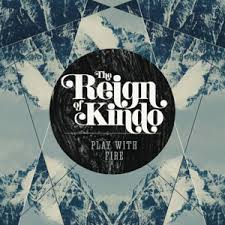Artist: Reign of Kindo
Album: Play with Fire
The songs I embed with a review are always, I figure, better than nothing, but they range from “desperately-grabbed only YouTube evidence this artist exists” to “an illustration of one of the several approaches the artist uses” to “just right”. In the case of Reign of Kindo‘s Play  with Fire, I’ve got the latter: not only is the Hero, the Saint, the Tyrant, and the Terrorist my favorite song here, but its five minutes tour Reign of Kindo‘s varied strengths. I mention this because whether the song intrigues you, at least some, would be objective data for you. While I find myself more aware than usual of how the comparison points I choose for an artist can paint very different pictures.
with Fire, I’ve got the latter: not only is the Hero, the Saint, the Tyrant, and the Terrorist my favorite song here, but its five minutes tour Reign of Kindo‘s varied strengths. I mention this because whether the song intrigues you, at least some, would be objective data for you. While I find myself more aware than usual of how the comparison points I choose for an artist can paint very different pictures.
For example. They’re an agile piano-pop band with smart philosophical lyrics, jazz leanings, and fluent crooning by Joseph Secchiaroli. Their second album This is What Happens, in my top ten of a musically wonderful 2010, showed a particular flair for lovely ballads and a comfort with off-kilter time signatures. Play with Fire, album #3, is more consistently fiery and gives the band more chances to show off, still in pop-song format. I can fairly compare them to Ben Folds, say (both his balladry and his early jazzy showing-off) — with a bit of the Dave Brubeck Quartet’s calm ensemble fluency, and some of Stevie Wonder’s melody-writing quirks. Obviously, an album that’s hip and reputable.
But the first comparisons I thought of for Play with Fire included, well, Barry Manilow (mostly At the Copa, a great song, but I was still all “Barry Manilow?”). Also Sting’s solo career — Fortress around Your Heart, All This Time, Seven Days — if we took away his synthetic production, focused on what his jazz sidemen bring, and gave him a lower, more conventionally pretty voice. The album’s one serious misstep for me, Impossible World, sounds exactly like music from a Carnival Cruise Line ad. And the dynamics and structure of the uncharacteristically lust-driven Feeling in the Night feel like a musical exploration of what hair-metal power balladry would have been, had it been a form of jazz centered in 5/4 and 7/4 time. (No, no, that’s a good thing.)
More often Reign of Kindo‘s lyrics are reflective. Christianity is central to their background, which they have mixed feelings about. My favorite song from This is What Happens, the gorgeous Comfort in the Orchestration, was about the desire to believe in a benevolent masterplan — your own if possible, a Creator’s as an unreliable backup source of hope once you realized “you’re not in control”. The same album finished with Psalm, its last lines being “I need a miracle”, but was an original and evocative use of the “sing to God as if you’re singing to a girl” trick, admitting “Ten thousand reasons I don’t give You time … I understand if You’ve had a change in plans, because You don’t need me the way I need You”.
Play with Fire is less concerned with God, more with the people who claim to represent Him. It starts “I’ve been told I’m evil, born into this world of sin from the day I left my mother’s womb. I’ve been told I’m fallen, that my nature is untrue, they say ‘You need God’s  forgiveness, son, or you’ll burn in hell with everyone’. I kindly ask them why; I may have caught them by surprise, but I know they’ll think of something… blind faith is blindness just the same, it can justify the cruelest claims”. Dust builds a Book of Common Prayer passage (“ashes to ashes, dust to dust”) into “We once were children building castles in the sand/ we’d smash them back into the land/ we’d call it all good fun./ Now we build them big and tall/ We weep and cry each time they fall… We try so hard to leave a mark/ we end up mostly leaving scars”. The Man, the Wood, and the Stone is a fable that ends the album with its title: the man who first discovers a reliable way to make fire is eager to show everyone else how he did it, but “the priests and the preachers, they heard of this man… and conspired to end him in secret… and taught ‘Man is evil, he must do as the law requires, and he must never, ever play with fire'”. As literal pre-history it’s nonsense; as a song about power and ideology today, it’s potent.
forgiveness, son, or you’ll burn in hell with everyone’. I kindly ask them why; I may have caught them by surprise, but I know they’ll think of something… blind faith is blindness just the same, it can justify the cruelest claims”. Dust builds a Book of Common Prayer passage (“ashes to ashes, dust to dust”) into “We once were children building castles in the sand/ we’d smash them back into the land/ we’d call it all good fun./ Now we build them big and tall/ We weep and cry each time they fall… We try so hard to leave a mark/ we end up mostly leaving scars”. The Man, the Wood, and the Stone is a fable that ends the album with its title: the man who first discovers a reliable way to make fire is eager to show everyone else how he did it, but “the priests and the preachers, they heard of this man… and conspired to end him in secret… and taught ‘Man is evil, he must do as the law requires, and he must never, ever play with fire'”. As literal pre-history it’s nonsense; as a song about power and ideology today, it’s potent.
Impossible World is a love song, Help It is an eloquent song about dancing, Romancing a Stranger is about being an incompetent suitor, I Hate Music is an attack on pop radio. I’ve already mentioned the please-have-sex-with-me song; Play with Fire is only sometimes earnest, and the playing is often, even usually, joyful. But when Secchiaroli tells us “My notebook’s a sight/ Every sentence I write/ is swiftly crossed out before long”, he’s easy to believe. I didn’t cross out some comparisons Reign of Kindo might have preferred me to. But look, there’s the embedded video, letting the band make its case for itself.
– Brian Block
To see the rest of our favorites, visit our Favorite Albums of 2013 page!
